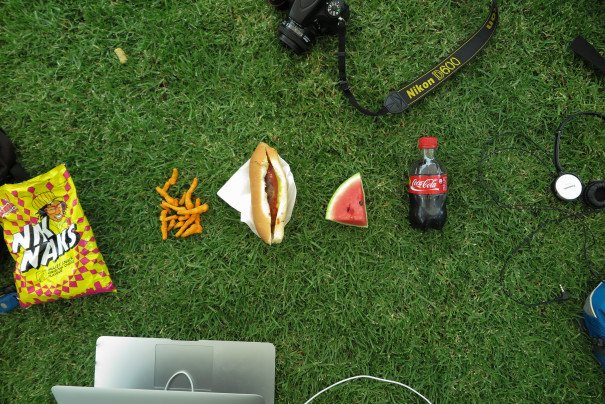
Buying a Sausage Out of a Car in Front of the Blade Runner’s House

Buying a Sausage Out of a Car in Front of the Blade Runner’s House
Boerie Rolls on Oscar Pistorius’s Curb
No one has slept for more than three hours.
The news broke overnight, so the pack has relocated.
The tent city outside the gates of Kgosi Mampuru II prison in Pretoria has moved, leaving behind the prison’s broad, jacaranda-strewn roadside and friendly petrol station for the passive-aggressive, manicured curbs of wealthy Waterkloof. There is a redbrick wall, behind which lurks a remorseful man with no legs.
I haven’t slept for more than three hours in days.
In the last week, I’ve spent more time on planes and in airports than on real land. My commute to work began 26 hours ago, from an ill-fated family visit to Southeast Asia.
I haven’t eaten, because I’ve been live on breakfast television since 6 am.
Someone jokes: Ah, the days when breakfast was just a meal, and not a job description. Haha.
Oscar’s new prison is named Bataleur, in the way that posh houses have names. It has bay windows, a turret, and one of those sweeping one-way-only driveways, which now features a jungle of tripods and a sprawl of journalists, legs akimbo between the flower beds: a peculiar assortment of gossiping curbside garden ornaments, balancing cameras, MacBooks and lethargy.
Every time the gate opens, a bolt of panic shoots through the masses. Sometime before midday, a terrified flower delivery man arrives clutching a small pot of chrysanthemums, and is chased by a flock of shooters, running to safety behind the wrought iron.
It’s at that straw-camel-back point of ridiculousness when we all realize we’re famished. The BBC has ordered pizzas, topped with fresh avocado. They have cooler boxes filled with chilled water. Everyone else is eating bad crisps in varying shades of Mexican chili and faux cheddar.
An enterprising Afrikaans man has shown up in a sunshine-colored 1980s Ford Escort and parked it in Pistorius’s neighbor’s driveway. He’s flogging enormous bags of fluorescent puffs for 10 Rand that would send any children’s birthday party into toxic shock. No one’s buying them, so he’s taken to eating them himself. He confers with a local cameraman, and disappears.
He returns, wielding two bags of anaemic boerewors—an oversized take on farmer’s sausages—and a braai or barbecue. The intoxicating scent of roasting meat wafts down the street. Heads turn. I ask his name. De Villiers, De Villers Booysen, he says. It’s French, he informs me. From the ancestors.
The Huguenots? asks a photographer.
Yes! enthuses De Villiers. We came to South Africa to rape and pillage and make wine. He laughs uproariously. He has brought a plastic glove to reassure us all of his food hygiene standards. I sit in a camp chair on the CNN patch of sidewalk and watch as he uses the glove to hold buns for slicing, then pats the raw sausages affectionately as he lays them over the coals. We make bets about who’ll get E. coli.
Their new business correspondent is making calculations on her smartphone: two bags of wors (as the sausages are known for short), five kilos each, 202 Rand a bag, say 50 sausages in all, being sold at 30 Rand a boerie roll. De Villiers is raking it in. She tweets it.
My order of wors is the second off the grill. It’s too short, and only covers about half the bun. To conceal the poor meat-bread ratio, De Villiers squeezes on layers luminous pink ketchup and mustard the texture of Halloween pus.
There are fried onions sizzling in an aluminum pot on a camp burner, but in his excitement of a second sale, he’s forgotten to offer me any.
Under the AP tent, I assemble a collection of donated goods, accoutrements for my breakfast feast: a wedge of watermelon from AFP, a handful of NikNaks from CNN’s broken-footed cameraman. It is reporting comraderie in kind, built up over years of shared nuts during courtroom recesses, and muesli bars outside hospitals housing dying statesmen.
I bite in. My boerewors roll is desperately salty and lukewarm, meat crumbs in my mouth coated with white grease and powdered coriander. I close my eyes, try to pretend I’m at a poolside braai, drink in hand, and it’s juicy and delicious. I fail, and use the watermelon as a palate cleanser.
We lie on the grass in front of the neighbor’s electric fence as we wait for laptops and batteries to charge: donated power from a diesel generator. I should have brought a picnic blanket, says the AP coordinator. Around us, correspondents are practicing their lines.
Americans are loud, EISH, says a photographer.
They talk in stereo, eh? says another.
The French are sniggering. We’re all parched, but too scared to drink anything because there is nowhere to pee. Someone suggests hiding behind a pillar in a treelined driveway. There’s a nice little path with a view and a bush for the camping inclined, says a satellite operator named Barry. I glance down the road. An American correspondent is wandering under the jacarandas, doing up his fly.
A private helicopter flies over the Pistorius mansion, man hanging out with a camera. A woman in large sunglasses drives past, angrily eating rice crackers from her lap. A traffic jam of Porsches briefly develops. The drivers stare at us.
We stare back at them, trying to work out if they’re secretly members of the Pistorius family, come to visit. Do they have Oscar in the boot?
They peer, glare, take photos on smartphones and zoom off. One Z3 with a ZZZ 333 personalized license plate does the rounds twice.
Who are these people? I ask Barry.
That’s what they’re saying about all of us, he shrugs.